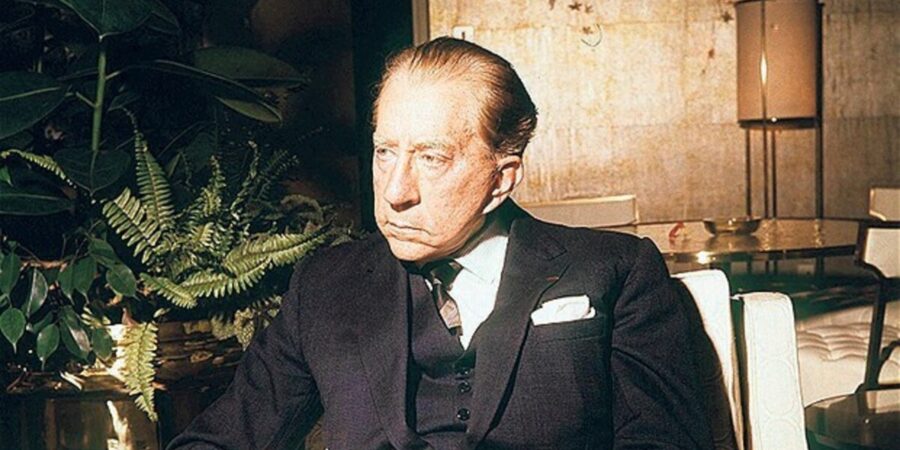J. PAUL GETTY – The door to the American Millionaire’s Club is not locked. Contrary to popular modern belief, it is still quite possible for the successful individual to make his million and more. There will always be room for the man with energy and imagination, the man who can successfully implement new ideas into new products and services.
Anyone who has achieved success is frequently asked the same question by the people he meets:
“How can I—or others—do it, too?”
When I tell them how I began building the foundations of my own business as a wildcatting operator more than four decades ago, they usually reply:
“But you were lucky-you started in business at a time when it was still possible to make millions. You couldn’t do it nowadays. No one could.”
I never cease to be astounded by the prevalence of this negative-and, in my opinion, totally erroneous attitude among supposedly intelligent people. Certainly, there is a tremendous mass of evidence to prove that imaginative, resourceful, and dynamic young men have more opportunities to achieve wealth and success in business today than ever before in our history. Countless alert and aggressive businessmen have proved this by making their fortunes in a wide variety of business endeavors in recent years.
One man I know was a lower-bracket corporation executive when, in 1953, he heard of the development of a new,
particularly tough and versatile plastic. He perceived that it would make an excellent and economical substitute for certain costly building materials. Using his savings and some borrowed money to buy the manufacturing license and to provide the necessary initial working capital. He went into business for himself producing and distributing the plastic. By 1960, he was personally worth well over a million dollars.
John S. Larkins, a young engineer, took over the Elox Corporation-a tiny Royal Oak, Michigan, electronics – equipment manufacturing firm-in 1951. Seeing that there was a great and constantly growing need for electronic-control devices in the industry, Larkins concentrated on developing and producing these items. Within six years, he had increased his company’s gross sales from $194,000 to more than $2,200,000 per year.
In 1942, Charles B1uhdorn, then 16, began his career as a $15-a-week cotton brokerage clerk. By 1950, he had made his first million on his own-mostly by importing coffee from Brazil. Today, he is the kingpin of multitentacled Gulf & Western Industries, whose annual sales well exceed a billion dollars.
There are innumerable such modern-day success stories. Among those with which I am personally acquainted, none is more telling or to the point than that of the late Melville (Jack) Forrester.
Jack Forrester served with distinction as an OSS agent in Europe during World War Two. After V-J Day, he found himself in Paris, out of work and low on funds. He finally obtained a job as a sort of bird-dogging contact man with a large investment firm, the World Commerce Corporation. Forrester toured Europe, the Middle East, and Asia, looking for promising projects and enterprises in which World Commerce Corporation could invest money. A shrewd
and astute businessman, he did so well that within a few years he was made president of the firm’s French subsidiary, World Commerce Corporation of France. I had known Jack before the War. I met him again in Paris in 1949. He told me what he had been doing since V-J Day.
“How would you like to do some work for me?” I asked him.
“I don’t know much about the oil business,” he replied with a grin. “But I suppose I can learn fast enough.”
Jack did learn fast and well. After 1949, he conducted many delicate and important negotiations for several of my companies. He was instrumental in obtaining valuable oil concessions and prepared and smoothed the way for many other operations and transactions including deals for tanker refinery and pipeline construction.
In 1945, Jack Forrester was an ex-OSS a man without a job and with very little money. He was just another of the many millions of men who were trying to “reconvert” to peacetime existence. At his untimely death in 1964, he had become an eminently successful businessman and a millionaire. There are examples galore to prove that it can be done that success in business and even “making a million”-or millions-are entirely realizable goals for young men
starting out today. I consider myself neither prophet nor pundit economist nor a political scientist. I speak simply as a practical working businessman. The careful, continuing study and evaluation of American and international business conditions and trends are, however, among my most important duties and responsibilities to the companies I control.
Basing my opinion on the information I have been able to gather throughout the years, I believe that, barring the cataclysmic unforeseen, the outlook for business is good and that it will become even better as time goes on. I feel that farsighted, progressive—and, above all, openminded-American businessmen, be they beginners or veterans have ample reason to be optimistic about their prospects and profits for years and even decades to come.
I say this fully aware that in some American business circles, it has long been fashionable-if not downright mandatory-to bemoan lack of opportunity and the stifling of free-enterprise capitalism.
“Confiscatory taxation,” “excessive labor costs,” “unfair foreign competition” and “creeping socialism” are the “causes” most often cited for what the doom-mongers would have us believe is the imminent disintegration of the American Free Enterprise System. To my way of thinking, all this is sheer nonsense. The complaints are merely convenient alibis for the unimaginative, the incompetent, the nearsighted and narrow-minded, and the lazy.
True, taxes are too high and far too numerous. One of this days-and soon our entire tax system will have to be
overhauled from top to bottom. A logical, equitable tax program will have to be devised to replace the insane hodgepodge of Federal, state, county, and city levies that make life a fiscal nightmare for everyone. In the meantime, however, businessmen will just have to live with the situation. Let’s be honest about it: that they can live with it is
obvious enough. Income taxes-the most abused whipping boys-are, after all, levied only on profits. There are proportionately more well-to-do businessmen in the United States than ever before. I’ve never heard of a single American firm that had to close its doors because of taxation alone.
Labor costs are also high, but I’ve often observed that the man who complains the loudest about excessive wages is the same one who spends fortunes on advertising and sales campaigns to sell his products to the millions. How on earth he expects the workers who form the bulk of those millions to buy his chinaware, garden furniture, or whirling-spray pipe cleaners unless they are well paid is beyond my comprehension.
Labor is entitled to good pay, to its share of the wealth it helps produce. Unless there is a prosperous “working class,” there can be no mass markets and no mass – sales for merchants or manufacturers-and there will be precious little prosperity for anyone. For its part, labor must understand that high wages are justified and can remain high—only if
workers maintain high levels and standards of production. And, as long as we’re talking about things that are high, I
might add that I, for one, think it’s high time both capital and labor realized these basic home truths and ceased their eternal and costly wrangling. Whether either likes it or not, one cannot exist in its present form without the other. I doubt very seriously if either would find the totalitarian alternatives to the existing system very pleasant or palatable.
As for foreign competition, it has long been my experience that competition of any kind is promptly labeled unfair when it begins to hurt those businessmen who do not possess the imagination and energy to meet it. Competition-foreign or otherwise exists to be met and bested. Competition the stiffer and more vigorous the better is the stimulus, the very basis, of the free-enterprise system. Without competition, business would stagnate.
These facts are conveniently ignored by those individuals and pressure groups who loudly demand that the Federal
Government does something about “unfair” foreign competition. The “something” they want the Government to “do” is, of course, to raise sky-high tariff walls which would prevent foreign countries from trading with us about as nearsighted a policy as one could imagine.
Creeping socialism? That particular plant is proven to be false and without foundation by the very fact that there are so many more free – enterprise – systems American businessmen to voice it today than there were ten, twenty, or more years ago.
In short, I can’t see any validity -in the arguments advanced by the pessimists and defeatists. But then, calamity howlers have always been with us, chanting one dismal and discouraging chorus or another. When I purchased the Hotel Pierre, located on Manhattan’s swank Fifth Avenue at 61st Street for $2,350,000, it was New York’s most modem hotel. No crystal ball was needed to show that this was an excellent buy. The country was rapidly emerging from the Depression; business conditions were improving steadily.
Business and personal travel were bound to increase greatly. There had been very little hotel construction in New York for several years, and none was planned for the immediate future. The Pierre was a bargain and a hotel’ with great potential. But the gloom-and-doom chaps were too busy titillating their masochistic streaks with pessimistic predictions of worse times to come to recognize such bargains as this when they saw them.
I began negotiations for the purchase of the Hotel Pierre in October 1938 and took possession the following May, At today’s land and construction costs, between 25 and 35 million dollars would be needed to duplicate the Pierre in New York City. I’m not crowing; I’m merely trying to show that there are always opportunities through which businessmen can profit handsomely if they will only recognize and seize them-and if they will disregard the pessimistic auguries of self-appointed prophets of doom.
Conditions are much different now than they were in 1938, 1932 or 1915. Just the same, the last thing that American business needs are complaints, alibis, and defeatist philosophies. What American business does need-and in ever-increasing numbers-are young businessmen who are willing and able to assume the responsibilities of progressive,
vigorous industrial and commercial leadership? The rewards awaiting such men are practically limitless. There is plenty of room at the top. That figurative Millionaire’s Club has an unlimited number of vacancies on its membership rolls. That these aren’t being filled faster is, I’m afraid, due largely to the fact that too many potentially highly qualified young applicants give up before they start. They listen to cautionary defeatism instead of opening their eyes to the opportunities around them. They are apparently blind to the many examples provided by those who have made and are making their fortunes.
As I’ve said, I started my own business career in the petroleum industry as a wildcatter, and oil has remained my main business interest. I find it discomfiting that so many young men today have an idea that the era of the relatively small-time wildcatter is over. Actually, nothing could be further from the truth.










Leave a Reply